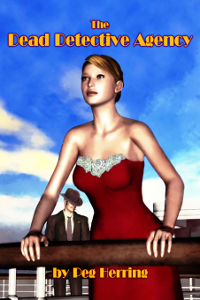Guest Post: Peg Herring
I am very happy to welcome mystery author Peg Herring as she travels the blogsphere. Here she explores the way language travels over time.
The first part of this post can be read at former independent bookseller Leila Taylor’s terrific blog.
 It’s a must-read for language lovers and history buffs alike. Plus, there’s a very neat contest and potential giveaway for those who leave a comment!
It’s a must-read for language lovers and history buffs alike. Plus, there’s a very neat contest and potential giveaway for those who leave a comment!
Thanks, Jenny for the guest spot!
The Post – Why Do We Say That? Part II
Would you be offended if I called you a “wench” or a “knave”? Both terms were once used for people of the lower class, and they would have taken no offense at being called what amounted to “servant”. However, such terms were insults to the nobility due to their pride of class, so today, a wench is a woman of loose morals and a knave is a dishonest man. What was once simply descriptive has become pejorative. Language scholars call that “lowering”.
Oddly, it’s hard to keep any word associated with the sense of smell from lowering. At one time, “stink” and even “stench” were everyday words for smells, and “reek” is the OE word for “smoke”. Even “smell” is more negative than positive today unless you combine it with other words: “smells good” or “smells like–”. We choose words like “fragrance” or “aroma” to convey that a smell isn’t bad.
In Shakespeare’s time, “nice” meant “silly”, so when Benvolio speaks in ROMEO AND JULIET of a “nice” quarrel, he means there was no reason for it. You wouldn’t mind being called “nice” now, so that word is said to have “elevated”. Similarly, “naughty” in Elizabethan times meant “evil”, but now we use it for mild misbehavior, particularly for small children or little sexual peccadilloes.
Some words “widen” in meaning, that is, they once meant a specific thing and now are more general. A wonderful example is Guy Fawkes, who tried to blow up the British Parliament in the 1800s. People began celebrating the day the plot was foiled by making and hanging effigies called “guys”. From that, a male who was acting like a dummy was called a “guy”. The word elevated as it widened over time so that all males were called “guys” and now, it’s pretty common to address a group of both males and females as “you guys”. From one individual to as many as you like: that’s major widening.
Words also “narrow” in meaning. Terms that once meant a lot of things become more specific. “Meat” was once the term for all food; think “meat and drink” in old poetry. (To name what we call meat, medieval folk would have said “flesh”, but you didn’t want to know that, did you?). “Deer” was a general term for wild animals, “corn” for all grains, and ‘hound” for all dogs. “Starve” once meant to die from any cause, and an “undertaker” was anyone who began something.
It makes me wonder what words of ours our descendants will use differently. Certainly words like “phone” and “computer” are undergoing substantive changes. Will your grandchildren believe that either of these things was once connect to a wall by means of a plug? The term “phone”, already shortened from “telephone” by popular use, seems likely to widen to encompass all kinds of devices that do much more than “hear from afar”. Change is inevitable, but don’t try to convince your girlfriend that it’s okay that you called her a “hussy”. After all, it just meant “housewife” to the folks in the eleventh century!
The Poser-Name an historical series/book where the protagonist uses early CSI methods.
The Prizes-Weekly prizes (your choice of THE DEAD DETECTIVE AGENCY in e- or print format) drawn from the names of those who comment on the blogs as we go. Comment once/day, but the first commenter each day gets entered twice in Saturday’s drawing!
The Pathway: The next entry and the answers/comments to the Poser will be at two spots (!) http://themysteryworld ofpabrown.blogspot.com AND http://pabrown.livejournal.com
The Pitch: THE DEAD DETECTIVE AGENCY, First in The Dead Detective Mysteries, paranormal mystery. Tori Van Camp wakes in a stateroom on a cruise ship with no memory of booking a cruise, but she does have a vivid recollection of being shot in the chest. Determined to find out what happened and why, Tori enlists the help of an odd detective named Seamus. Together they embark on an investigation like nothing she’s ever experienced. Death is all around her, and unless they act quickly, two people she cares about are prime candidates for murder. Read more about this book and the author at http://pegherring.com or buy the book at http://www.ll-publications.com/deaddetectiveagency.html.
Peg Herring writes historical and contemporary mysteries. She loves everything about publishing, even editing (most days). Peg’s historical series, The Simon and Elizabeth Mysteries, debuted in 2010 to wonderful reviews. The second in the series will be available in November from Five Star.






Great post! I can think of other words that have made radical changes along the way. “Battery” comes to mind, along with many of our superlative words like “awesome”. And who uses words like “divan” or “davenport” any more?
Oh, the first CSI guy I can think of is the Sherlock Holmes series by Sir Arthur Conan Doyle.
Comment by G Thomas Gill — February 14, 2011 @ 10:02 am
You scurvy cur! I *love* the evolution and devolution of language through time. Fascinating stuff! AWESOME stuff. I often think of the real quote from Shakespeare, which is misquoted by Willy Wonka: a good deed shines in this naughty world, with naughty meaning naught as in zero. Anyway, please do enter me for the giveaway! Thank you!
Comment by Savvy — February 14, 2011 @ 10:18 am
“Wench” is one of those words that can always make me smile, just a little. Perhaps it’s a tiny remnant of my pathetic version of bad girl days oh so long ago
Comment by Lelia Taylor — February 14, 2011 @ 1:42 pm
I’ve been researching insults for my Simon & Elizabeth historical series, and I love some of the old words: “strumpet”, “fopdoodle”, “varlet”, and the ever-popular “cod’s-head”!
Comment by Peg Herring — February 14, 2011 @ 3:54 pm
Great post! As a word nerd, I love word origins. (And I was actually a wench once, at a medieval fund-raising dinner. Trust me, wenches have more fun.)
When I think of a series with early CSI methods, the first one that comes to mind for me is Ellis Peters’ Brother Cadfael series.
Comment by Lauren S — February 14, 2011 @ 5:18 pm
Peg, I had every intention of following your blog tour every stop, but I’ve fallen by the wayside. I don’t know how you keep up the pace! Thanks, Jenny, for getting me back on track.
I have this idea that since I was so fortunate as to win (and LOVE) HER MAJESTY’S FIRST MURDER The aura should cling and I should win THE DEAD DETECTIVE AGENCY, too. Hope I’m right. Best of luck with it.
Comment by Donna — February 14, 2011 @ 10:55 pm
In a perfect world, my publisher would say something like, “All these commenters are so good, let’s just give them all a copy of the book.”
Probably not going to happen, so good luck to all!
Comment by Peg Herring — February 15, 2011 @ 9:12 am
Love language lessons. My suggestion for CSI methods would be Ariana Franklin’s great series beginning with Mistress of the Art of Death.
Comment by shirley nienkark — February 17, 2011 @ 2:02 pm